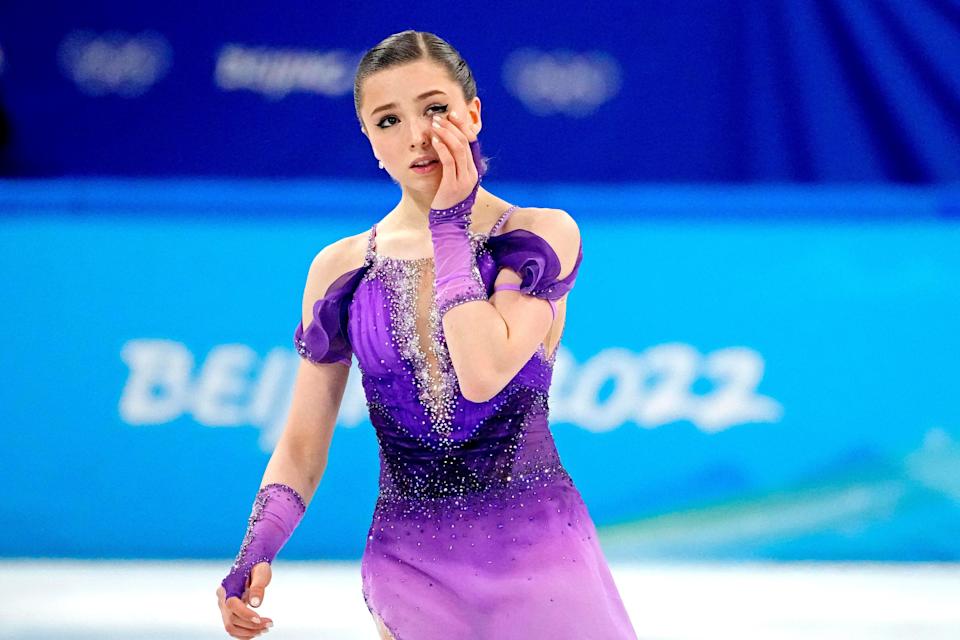BEIJING – Russian figure skater Kamila Valieva should not have been first in the Olympic women’s short program, according to a well-known retired Olympic and world figure skating judge from the United States who co-wrote the criteria for the program components on which the sport’s artistry is based and judged.
Joe Inman said in a telephone interview with USA TODAY Sports on Wednesday that after watching and re-watching the women’s short program Tuesday from his home in Northern Virginia, he believes Valieva should have been third behind Japan’s Kaori Sakamoto, followed closely by Russia’s Anna Shcherbakova. Those two skaters finished third and second, respectively, behind Valieva, who made a major mistake on her triple axel in the first 30 seconds of her program.
OLYMPIC NEWSLETTER: Sign up now to follow USA’s chase for gold in Beijing
BEIJING TEXT UPDATES: Get behind-the-scenes access to the Beijing Olympics
KAMILA VALIEVA TAKES THE ICE: American skater upstages her where it matters
THE CONTROVERSY: Olympic figure skaters support idea of age restrictions
Valieva ended up with 82.16 points, followed closely by her training partner Shcherbakova with 80.20 points and Sakamoto with 79.84. They are close enough that each could win the competition Thursday in the women’s long program.
“Kamila Valieva started off cautiously,” Inman said. “She is an exquisite, once-in-a-century skater, but this was not one of her best efforts. She was a bit lackluster. The attack was not there as we saw a week earlier in the team event.
“She skated like she was saying, ‘Am I going to be able to do all these things?’ She was tentative even before the triple axel.”


In practice a few hours earlier, she had fallen on the jump twice before landing it, although Inman said he did not know that and that wouldn’t have mattered to any of the judges at the Olympics, or to him. Skaters fall in practice all the time.
Valieva, 15, is under intense pressure after testing positive for a banned substance on Dec. 25, then being allowed to skate here by the Court of Arbitration for Sport.
As Valieva began her short program, then approached her takeoff on the triple axel, the most difficult triple jump there is, Inman said she appeared tentative.
“It was a poor jump,” Inman said. “She was tilted in the air. To me, she was cautious even going into it. After that, she was either running a bit early or late to her music on everything else she had planned. She was just off the mark.”
Neither Sakamoto nor Shcherbakova tried a triple axel; they did a double axel in their short programs. Even with an awkward landing and step out, Valieva received more points for her botched triple axel than the other two did for their strong double axels, based on the value of the tougher jump: 5.26 points for Valieva to 4.29 for Shcherbakova and 4.81 for Sakamoto.
The margin would have been much wider had Valieva landed the jump cleanly. In the team competition, she had no problems with it and raked in the points: 11.31 for that jump alone.
But the scoring on the jump was not a problem for Inman. This was: even with the mistake on the triple axel and what he saw as obvious flaws in her artistry, Valieva received a higher total program component score than her two closest competitors: 37.65 points to Shcherbakova’s 37.33 and Sakamoto’s 36.62.
That score covers five program components: skating skills, transitions, performance, composition and interpretation of the music.
“Kamila was overmarked,” said the 75-year-old Inman, who no longer judges internationally due to an age limit imposed by the International Skating Union, which states that judges must retire when they reach 70. Inman also has retired from judging in the United States, which is why he said he could speak freely about Olympic judging.
“Because of the triple axel, to me, it caused her to be off her phrasing, which is defined as how someone skates to the structure of their music,” said Inman, a career musician who played in the U.S. Army band for 21 years. “Because of these issues, I was surprised the program component scores were as high as they were. Her spins were excellent and her step sequence was fine, but to me, the interpretation was a problem. She didn’t skate it with the elan she normally does. She was cautious, all the steps and turns were cautious.”
Yet there was barely a difference between Valieva’s total program component score from her masterful team short program – 38.51 – and the 37.65 she received Tuesday for a lesser performance. The term “propping up” a big-name skater has been around the sport as long as there have been salchows and lutzes. It would hardly be a shock if the judges gave Valieva the benefit of the doubt Tuesday, and with it, higher artistic marks.
In Inman’s mind, Sakamoto and Shcherbakova were more deserving. Why?
“First of all, neither made a mistake, which affects a performance in a negative way,” he said. “Kaori’s jumps were exquisite. They cover the ice with excellent flow in and out. She skated freely. And Anna is musical, she is a beautiful, fluid skater, and she was very good Tuesday.”
This article originally appeared on USA TODAY: Kamila Valieva doesn’t deserve first place, former skating judge says
